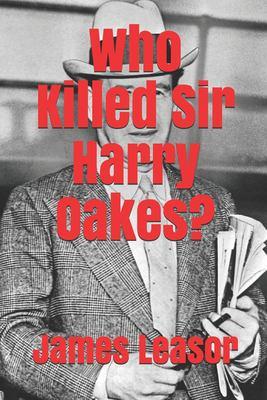
Who killed Sir Harry Oakes?
Available Copies by Location
| Location | |
|---|---|
| Community Centre | Available |
Other Formats
Browse Related Items
| Subject |
| Oakes, Harry, Sir, 1874-1943. Murder > Bahamas. |
- ISBN: 9781539476443
- Physical Description 1 volume (unpaged) ; 23 cm
- Publisher London : James Leasor Publishing, 2016.
Content descriptions
| Bibliography, etc. Note: | Includes bibliographical references. |
Additional Information

Kirkus Review
Who Killed Sir Harry Oakes?
Kirkus Reviews
Copyright (c) Kirkus Reviews, used with permission.
The 1943 facts of the Sir Harry Oakes murder case in the Bahamas, strongly laid out in 80 pages--followed by a 140-page, novel-style scenario that offers Leasor's hypothetical version of what really happened. (To his discredit as a popular historian, Leasor doesn't clearly separate fact from fiction here; nor does the publisher.) The basic story is familiar, especially after the many re-tellings in recent Duke-of-Windsor bios: self-made tycoon Oakes was found dead in his Nassau-manse bed, apparently battered, then burned; his rakish Mauritanian son-in-law was arrested; the trial revealed that special investigators (from Miami) were guilty of incompetence at best, more probably an attempt to frame the son-in-law--who was acquitted. Leasor's explanation? Well, the Mafia--here called ""the Outfit""--was behind it all, of course, just as it was behind the sinking of the Normandie and Thomas Dewey's well-financed rise (two of several irrelevant ""faction"" vignettes here). The Outfit wanted a base in the Bahamas, which meant a new gambling casino; the Duke of W. and Oakes' chum Harold Christie went along, thanks to greed and blackmail. (The Duke's financial shadiness and Nazi ties.) But Sir Harry was adamantly opposed, winding up semi-accidentally murdered by an Outfit enforcer. And both Christie and the Duke (who hated Oakes' son-in-law for personal neurotic reasons) went along with the US/Outfit attempt at coverup and frame-up. With no documentation whatsoever this is hardly more than idle speculation--inspired, perhaps, by the similarly inclined innuendos in Michael Pye's King Over the Water (1981) and other Duke books. Only those who like their ""fact"" in fiction form will be diverted or even half-satisfied. Copyright ©Kirkus Reviews, used with permission.


